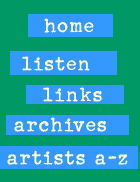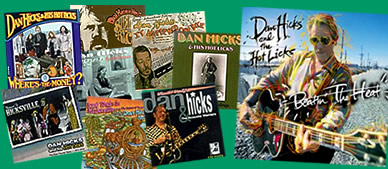 |
 |
||
DH: So, I'm here at your disposal, man. And I appreciate your call.
PM: It's my pleasure. How did it go with Mojo yesterday? [the excellent, in-depth music magazine from London]
DH: Uh, okay. It was a longer piece. It started last week, and then they wanted to extend it. The guy mainly wanted to know about the Charlatans days [a San Francisco rock band that Dan was in before he started the Hot Licks, early 60s]. I think he's doing a special article on that period, which I'm happy to take questions about. He was leaning on a certain angle, like: "Were the Charlatans ever burned about how the other bands got all the fame, when they were really the first ones?" and weren't all the other bands picking up on what we were doing, et cetera. Maybe that was true to some small extent, but not much of one. But he was working that angle, a who ripped off the Charlatans kind of thing, when it wasn't necessarily the case.
PM: He was leading the witness.
DH: He was leading the witness, and he didn't want to let it go. Who came to the Red Dog to dig the Charlatans and later formed bands…
PM: I actually don't know too much about the Charlatans, I'm afraid.
DH: There's been a big buzz about the Charlatans in the last couple of years. I've heard the word Charlatans more in the last few years than I'd heard it for the previous 20 years. People would interview me for years and never even mention the Charlatans. We did go back and play at the [Rock & Roll] Hall of Fame in Cleveland, there was An Evening with the Charlatans, we did a reunion thing, 3 or 4 years ago.
PM: Did any of the other members of the Charlatans go on to become distinguished players?
DH: Not exactly, though maybe on a regional level. Mike Wilhelm, he did a folk and blues thing, and was a member of the Flamin' Groovies for awhile, and did a single act, I believe. You can still catch him playing at a folk or blues festival.
PM: He's kept his hand in.
DH: Yeah, I'm not quite sure how he's doing at the moment, I heard he may be ill, actually. And Richard Olsen, who played bass in the Charlatans, was also a reed guy. He went on to lead a big band, a local society band that plays the Getty's parties, things like that here in the Bay Area, so he kept going, too. And George is a designer of furniture and other things.
PM: Were the Charlatans at all on the jazzy side, or strictly a rock band?
DH: No, it was generally rock and roll. There's a Charlatans album available now on Ace Records, from England.
PM: Oh, I gotta get that. I have to check you out as a rocker.
DH: I play a lot of drums on that album. There's a couple of my original songs that I eventually did with the Hot Licks. It was a folk rock kinda thing. We did some Stones tunes, and some John Hammond stuff, and Chuck Berry, too. We did a few originals, and some old-timey stuff, too.
PM: Old-timey?
DH: Like "Sweet Sue" or something, with a back beat. Doo doo doo doo, chik boom bop bop, like that. Make it danceable, you know, like folk music with a back beat.
PM: Were you singing in the Charlatans?
DH: I wasn't at first, I was just the drummer. I sang a couple of tunes from back on the drums, you know. I did a song called "She's On the Road Again" that's an old folk tune. And I was starting to do a single folk type act around town at this time, becoming a guitar player, a strummer and vocalist in the making. Our piano player played drums also, so eventually he would come back on the drums and I'd get up front and play rhythm guitar. I was in the band for about 3 years, and the last year I was the rhythm guitarist and singer full time. But I was only the lead vocalist when it was my turn, it was more about Mike Wilhelm and his blues rock stuff, he was the main lead singer.
PM: So how did you cross over from the Charlatans to the early days of the Hot Licks, what transpired in your life at this point?
DH: Well, we were living in the city. I joined the Charlatans in '65, and have clippings of me as a solo act as early as '63 in coffee houses. I was a folksinger, with a few original songs, doing a little fingerpicking. I didn't do that with the Charlatans, but I was in the San Francisco Folk Festival. At a certain point, the Charlatans were kind of falling apart, there was no good management, didn't seem to be any future in it. Nothing was materializing, nothing was getting better. I was only fond of the music up to a point. Rock and roll wasn't really my love.
PM: You were already a jazzer at heart.
DH: Yeah, 'cause I'd been since junior high school, been a jazzer. So I sort of took this single act thing and expanded it. I got together with a violinist and a bass player, to see if they could accompany me. We did it, essentially, to make a little demo of tunes. But then I started getting a couple of gigs, that kind of thing, and added the girls, a female accompaniment came to mind. I was listening to Sergio Mendes, stuff with female voices on it, and I kinda liked that. The bass player's wife sang, and she had a friend, and we gave that a shot, started doing gigs this way. Actually, there was no violin yet, it was just two girl singers, a bass and guitar. We did a thing at the New Committee Theater in North Beach [San Francisco] and got a good review from Ralph Gleason. I was still in the Charlatans at the same time, and had to make a decision. I figured I shouldn't do the Charlatans anymore, this new act would allow me to do all my songs, and I was beginning to get more prolific. Having other voices to write for, even just by ear, was very inspiring. So I started writing "I Scare Myself," and that kind of thing.
PM: So that was a very early song.
DH: Yeah. That must have been '68, when I quit the Charlatans and started the Hot Licks for real.
PM: Did any of the earliest players or singers stick?
DH: No, it kinda changed around. The first bass player left and then came back and did the record, Jaime Leopold, but then it was Bill Douglas, a jazz player from the East Bay.
PM: And the girls that stuck were Naomi Eisenberg and Maryann Price?
DH: Well, first it was Sherry Snow and Tina Gancher, they did the first album with me. Then I think Sherry decided she wanted to sing for God, you know?
PM: It happens, yeah.
DH: Some kind of spiritual enlightenment, we've heard about those. So I started over, that's when I found Naomi and Maryann. Then we started moving, and did a national tour.
PM: How did you run into the girls, Naomi and Maryann?
DH: I auditioned, man. This was when KSAN was going, and KMPX, and it was free form radio. I was a friend of theirs, and I had them put the word out on the air, with my phone number. So we got a lot of calls from girls who wanted to be singers, we auditioned a lot of girls.
PM: Nice.
DH: I did this twice, because at first I had Maryann and another girl who later left. Naomi had auditioned in the first round also, but it didn't happen until this second round of auditions. It wasn't word of mouth, it was more of a public thing. I had them coming over to my houseboat in Sausalito.
PM: You were at Gate 5, there?
DH: Yeah. They were coming over every hour on the hour, like that. We'd sing this and that, tape a few things.
PM: And were you playing the Guild acoustic way back then?
DH: Yeah, I think I was playing it by that point. I played a Gibson Southern Jumbo on the first album, and I'd had a Gibson Hummingbird also. When I was getting ready to record the second LP for Epic, which never got released, I got the Guild. I went over to see John Weber at Leo's Music in Oakland, and got two Guild F-50 guitars.
PM: Man, that F-50 was a good guitar...
DH: I still have that guitar. I still play a Guild live, it's not exactly an F-50, it's a little more modern version. I think it's just a taste smaller.
PM: I don't think the F-50 got knocked off properly. The whole thing about it was how big it was.
DH: I think they're going to make a real reissue of it soon. They're gonna make a special requirement guitar for me, not free or anything, when we get around to it. For now I'm just playing a version of the F-50.
PM: I always wanted one of those old posters of Eric Clapton playing the F-50 with the big afro. That was a real 60s icon for me.
DH: Oh yeah? He was playing acoustic?
PM: Yeah, in that he was. As a lifelong Dan Hicks fanatic, it's really exciting to have a new Hot Licks record. What's the background on how that record, with the Hot Licks format, came into being? continue